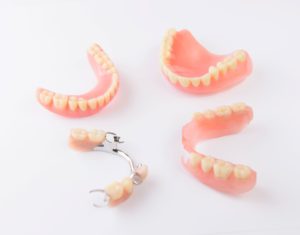
Dentures are a great way to refurbish your smile after tooth loss. They help you with daily tasks, like eating and speaking, that greatly impact your quality of life. Did you know, though, that tooth loss leads to changes in your facial structure? Your body gradually reabsorbs bone mass in your jaw because there are no longer teeth in place to stimulate growth and activity. That’s bad news for your dentures, which depend on your gums and the underlying bone structure for support. They may not sit as snuggly as they used to as a result of these changes.
You don’t want to wait to see your dentist if that’s the case. Though it may be tempting to hold off, there are several disadvantages to ill-fitting dentures. Keep reading to learn about 3 reasons you should have them adjusted sooner rather than later!
Reason #1: Swollen Gums
If your dentures no longer fit well, they’ll rub your gums raw in ways they’re not supposed to. They’ll be more prone to slipping or sliding in your mouth. The extra friction and added pressure can cause swelling and irritation. This makes them more likely to become injured or bleed when you have your dentures in. Not only is it uncomfortable, but it could allow germs to set in and cause infection. You can avoid all this by having your dentist verify whether yours needs to be relined or replaced.
Reason #2: Difficulties Speaking
Teeth play a crucial role in forming certain sounds and words that allow us to communicate with each other. Fortunately, even if you’ve lost all of your teeth, your dentures fill that role. If yours aren’t sitting as snuggly as they should, however, you could develop a lisp or other difficulties when you talk. Not only that, but they’re also more likely to fall out mid-conversation- how embarrassing! By having your dentures refitted, you’ll be able to speak smoothly again.
Reason #3: Jaw Soreness
Your jaw and mouth muscles work extra hard to keep your dentures in place when they’re not fitting correctly. Over time, the added effort will leave your face feeling sore. You might even develop a TMJ (temporomandibular joint) disorder. In time, you could experience painful muscle tension, a locked jaw, and headaches.
If you’ve noticed that your dentures are looser than they used to be, contact your dentist. They’ll be able to assess your condition to either restore or replace your dentures. Soon, you’ll once again enjoy the many benefits of a full, beautiful smile!
About the Author
Dr. Admasu Gizachew takes pride in getting to know a patient’s oral healthcare needs before devising customized treatment plans. He earned his dental degree at New York University, followed by residencies at Bellevue, Gouverneur, NYU and Coler-Goldwater hospitals where he trained others in cosmetic and implant dentistry. He has since also completed training for additional services including TMJ trigger points at the American Academy of Facial Aesthetics. That makes him an expert at replacing teeth to ensure your mouth and jaw stay healthy. You’re welcome to contact the office for an appointment on the website or by calling (732) 863-3899.
